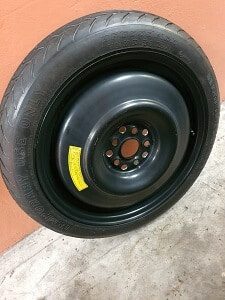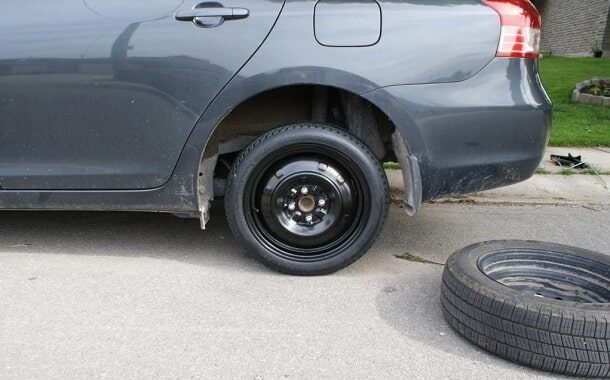How Much Does a Donut Tire Cost?
Last Updated on January 14, 2024
Written by CPA Alec Pow | Content Reviewed by ![]() CFA Alexander Popinker
CFA Alexander Popinker
That tiny spare tire in your trunk has an important job as your backup plan in an emergency. But how well do you know your donut spare? What’s the difference between a compact tire and a full-size spare?
And if you need to replace it, how much does a donut tire cost? This guide has the details on maximizing your spare for safety and savings.
Finding yourself stranded with a flat tire is no fun, but a donut spare allows you to temporarily get back on the road. However, compact spares have limitations on how far and fast you can safely drive.
Knowing these rules is key to avoiding damage down the line. We’ll also look at when it makes sense to upgrade to a full-size spare and what to expect to pay.
Highlights
- New donut tires cost $75 – $300 while full-size spares typically run $250 – $600 installed.
- Compact donut spares are meant only for temporary low-speed use in an emergency until you can get your standard tire repaired.
- Follow all usage limits – no more than 50 miles and 50 mph driving on a donut. Exceeding these risks damage or failure.
- Check compact spares at least annually for wear and proper inflation. Replace damaged or expired tires immediately.
- Consider upgrading to a full-size spare if you frequently drive long rural distances or haul heavy loads.
How Much Does a Donut Tire Cost?
A donut tire costs anywhere between $75 and $250 for the spare tire alone. Expect a total cost between $100 and $300 when you add mounting and installation and taxes on the product. So, if you need to purchase a replacement donut tire, either from the dealership or aftermarket, expect to spend:
- Compact Spare Tire – $75 to $250
- Mounting & Installation – $25 to $50
- Taxes – 5% to 10%
- Total Cost – $100 to $300
Factory spare tires from automakers are usually the most expensive option. Budget brands and used take-off tires help reduce the costs of replacing a compact spare.
According to Tire Mart Blog, the price of donut tires is stated to range from $50 to $200, and it is mentioned that about 1/3 of new cars are sold without spare tires.
The search results on Amazon display prices for donut spare tires, with examples ranging from $77.30 to $112.97.
Additional Costs of Owning a Donut Tire
Beyond just the spare tire itself, there are some other costs to factor in:
- Rotating and balancing – $20 to $40 every 5,000 miles
- Periodic mounting and reinstalling – $25 to ensure it fits
- Properly inflating the spare – a few dollars annually for air
- Replacing TPMS sensor battery – $50 every 5 years
- Storage well modifications – $100+ if the spare doesn’t fit
Types of Donut Tires
There are a few varieties of compact spare tires, each with different sizes and capabilities:
- Standard Donut – Smallest size, older spare type, very short range
- Temporary Spare – Slightly larger, 60-70% width of normal tire
- Folding Spare – Compromise size, can deflate when stored
- Full-Size Spare – Same size as regular tire, full function
What is a Donut Spare Tire?
A donut spare, also called a “compact spare”, is a smaller, temporary backup tire designed only for low-speed, short-distance emergency use. They are meant to get you to a tire shop, not to drive long distances. Donuts are easier to handle and take up less storage space than full-size spares.
Donut tires look like regular tires but are typically narrower and use shorter sidewalls. This gives a smaller overall diameter, allowing them to fit in a compact spare well under the trunk floor. But it also reduces the air volume and load capacity compared to a standard tire.
Donut Spare Usage and Safety Rules
Compact spares perform quite differently than your regular tires, which is important to keep in mind:
- 50 Mile Limit – Drive no more than 50 miles on a donut spare before replacing it with a regular tire. The short sidewalls can overheat at higher speeds.
- 50 MPH Max – Never exceed 50 mph when driving on a donut. The small contact patch limits traction and stability at highway speeds.
- Temporary Use Only – Donuts are meant only for getting to a tire shop for repair, not long-term use. Replace it with a full-size tire as soon as possible.
- Inflate Properly – Check the recommended inflation pressure on the sidewall. Donuts often need much higher pressure than regular tires. Under-inflation causes handling issues.
- No AWD Driving – Compact spares should never be used on all-wheel or four-wheel drive vehicles. It can damage the drivetrain.
Following these rules keeps you safe in an emergency when using your donut. But you should still have it replaced and get your standard tire fixed right away.
When to Use Your Donut Spare
The right times to put that little donut to use include:
- You get a flat tire on the road – install the donut so you can drive to a tire shop
- Before a long trip – if your full-size spare looks low, use the donut to reach a shop for air
- Rotating tires – place donut on one axle so you can move full-size tires to balance wear
- Testing it fits – when inspecting your spare, test that the donut can be installed properly
Conversely, you should avoid using your donut in situations like:
- Trying to “get a few more miles” out of a worn tire – donuts are for emergencies only
- On a planned long-distance trip – a donut won’t make it far; take a regular spare
- Towing a trailer – even a small trailer overstresses a compact tire
- Off-roading – the small tread and sidewalls aren’t built for rough conditions
Remember, the donut is just meant to limp to a tire shop, not keep rolling day after day. Get that flat fixed or replaced ASAP.
Replacing a Worn or Damaged Compact Spare
If your donut spare tire is worn down or becomes damaged, replace it right away rather than waiting for an emergency. A compromised compact spare could fail when you most need it.
Many automakers recommend replacing the donut every 6 years regardless of condition because the rubber deteriorates with age. Always check the manufacturing date code before trusting an older spare.
You might also like our articles about the cost of run-flat tires, valve system replacement, or tire installation.
If you need a new donut, you have a few options:
- New OEM Tire – Buy the same brand and model tire from the dealer; costs $75 – $300.
- Aftermarket Tire – Third-party compact spares are cheaper at $50 – $150.
- Used Tire – Check junkyards and classifieds for take-offs, often under $50. Confirm sizing fits your car.
- Full-Size Upgrade – Consider upgrading to a full-size spare for longer emergency use.
Upgrading to a full-size spare tire brings better emergency capability. But donut spares still work fine for their intended purpose if maintained properly.
When Does it Make Sense to Upgrade to a Full-Size Spare?
 Full-size spare tires provide much greater range and safety compared to compact donuts. While pricier, they’re worth considering in certain situations:
Full-size spare tires provide much greater range and safety compared to compact donuts. While pricier, they’re worth considering in certain situations:
- You drive long distances in rural areas without cell service
- You need to maintain highway speeds due to work requirements
- You frequently carry heavy loads which could over-stress a donut
- You experience frequent tire damage like sidewall punctures
- You drive an AWD/4WD vehicle (donuts should never be used)
- You don’t want space compromises of stowing a compact tire
A full-size spare fits right in the exterior mount like a regular tire and can be treated the same in an emergency. The biggest downside is losing interior trunk space. But the enhanced capability and range can provide valuable peace of mind for some car owners.
What Does a Full Size Spare Tire Cost?
Replacing your compact donut with a matching full-size spare from the dealership typically runs $250 – $350 for a plain steel wheel and tire. Getting a wheel that matches your existing rims is closer to $400 – $600.
You can also try checking tire and wheel shops for take-off tires to find a deeply discounted full-size spare. Or consider a used tire in good shape from a junkyard for around $50 – $100. Just be sure to match specifications to your car’s OE tire size.
Overall, while more expensive than a compact donut, upgrading to a full size spare tire can be worth it for the added security and functionality. Keep your specific driving needs in mind.
Ways to Save on a Replacement Tire
If you’re looking to save money on a new donut, here are some tips:
- Buy an aftermarket tire rather than the OEM brand
- Check discount tires stores for deals on compact spares
- Search classifieds and junkyards for inexpensive used tires
- Consider a puncture repair if tread life remains on current tire
- Ask the dealer if they offer spare tire discounts or coupons
Also remember you can often avoid the cost of a replacement by proper rotation and maintenance to maximize the lifespan of your existing donut.
Final Words
Donut tires serve a valuable purpose as an emergency backup. Understanding their capabilities, limitations, and costs helps ensure you can rely on your compact spare when you need it most. With the right expectations and care, your donut tire can give you vital mobility.


Leave a Reply
Want to join the discussion?Feel free to contribute!